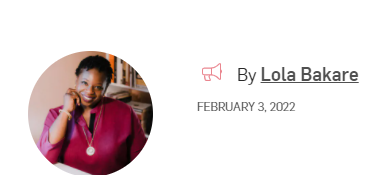#African-American #BlackAmerican #BlackHistorymonth #BlackHistory #AmericanHistory #BlackMaleTherapist #Triple5LightTherapy
During the month of February, Black employees across industries face a heightened awareness of our double consciousness. We are both bolstered by the prospect of positive recognition while we brace for the inevitable disappointment brought on by an endless barrage of the perfunctory and the performative.
Still, each year is a fresh opportunity for improvement that starts with a listening ear. During Black History Month please, consider what Black employees wish you would and wouldn’t do.
Do invest
Don’t oversee and ’empower’
When I asked members of the Black Girl Magic space on Fishbowl for Black History Month dos and don’ts, each response noted the challenges of management failing to get out of the way. From delayed content approvals to fear-driven “concerns” about programming ideas, the enthusiasm that should be met with resources is all too often met with resistance.
Instead, put your influence toward actively investing resources in the ideas flowing from the bottom-up. Ask “how can?” not “but what if?” Reframe how you think about the perceived risk to prioritize mitigating the risk of further moral injury to your Black employees before any others.
Also critical to consider are the conditions upon which investments are made. We invest in the ideas and energy of those who freely choose to create something we agree should come to life. When we empower, we influence others to activate our own ideas—in this case, Black employees—who may not actually care to participate in uncompensated labor beyond their day-to-day responsibilities.
If you’re unsure about whether your company’s current approach crosses the line to coercion, John Graham, author of Plantation Theory, recommends considering a few pointed questions:
- What is your company’s reason for engaging in any of the activities, panels, guest speaker sessions, etc.?
- Is the same desire matched by your Black employee base?
- Do they have the energy, mind space and emotional reserves to put their history on display and lead these efforts on top of their day jobs?
If the answer to most of these questions is no, allocate investments to improving Black lives in ways that do not require unpaid Black labor. “ERGs do so much unpaid DEI work, and companies are just beginning to launch initiatives that compensate those doing extra work for their time and dedication,” said Ejieme Eromosele, vp of customer success and account management at Quiq and former leader of the black@NYT ERG during her tenure at The New York Times.
Do be of service
Don’t be self-serving
In the same spirit, opportunities to be of service during Black History Month should prioritize scale and ongoing impact, not organizational optics.
“This is the time for companies to be self-examining and to take action to ensure its public commitment to racial equity matches its internal practices,” said Verneda Adele White, founder of the anti-racist platform America’s Hot Sauce. “Be intentional about creating sustainable business relationships with Black contractors, vendors and suppliers engaged for your Black History Month programming.”
“We want transparency,” shared Walt Geer, executive creative director of experience design at VMLY&R. “Talk to your Black employees directly and ask them what they need from you throughout the entire year. Playing Beyoncé in the break room and serving soul food doesn’t get us excited.”
To truly be of service, go beyond checking the box with actions that measurably address systemic inequality gaps over time.
Do recognize
Don’t tokenize
As consultant Dr. Raquel Rubin shared in conversation, sometimes the most powerful form of recognition is the simple act of “taking time to deeply and intentionally listen to each of their Black employees.” Consider the impact of managers gaining a deeper understanding of their Black employees’ individual lived experiences, at work and beyond.
In addition to 1-to-1 listening tours, tech marketer Sasha Mack suggested “inviting Black employees to shine a spotlight on people or groups doing impactful work inside or outside of the organization” to avoid emphasizing the single-story narrative that is often told about Black people and to expose colleagues to the multidimensional Black experience, beyond tokenization.” The tokenization of “usual suspects” all too often happens due to an unfortunate combination of risk avoidance and uncertainty.
When it comes to historical recognition, “companies should avoid the easy route of highlighting the usual, though relevant, cast of characters we hear about each year,” shared a senior director in the financial services sector. Instead, surface and spotlight the unsung industry-, brand- or company-relevant Black figures who fail to get the credit they deserve from within your organization. With a bit of digging, these examples are always abundantly available.
Do launch new initiatives
Don’t stop in February
To get this one right, think less about what you can “do” for Black History Month and more about what unsolved problems and unaddressed inequities you can begin or deepen the long-term process of meaningfully and measurably addressing during Black History Month.
As Victoria Princewill FRSA, author and organizational culture change consultant, shared, “This is an opportunity to practice accountability. This is a month that spotlights Black lives. Employers should be using this time to really focus on the tangible ways in which they can make the systemic bias of their office a relic of history.”
And real accountability has to start with unflinchingly facing and naming the truth. How is your company tracking against your DEI commitments, and what will be done differently going forward? This recent LinkedIn post from PepsiCo Beverages North America CEO Kirk Tanner almost gets there. How much more impactful would this have been had he named the reality that systemic racism is a problem his team faces within his own organization, not just in society at large?
For more ideas, visit these links to read all the Black Employee voices who shared their perspectives: Black Employee Perspectives on LinkedIn, Black Girl Magic Fishbowl, and Black in Advertising Fishbowl.



Comments
Post a Comment